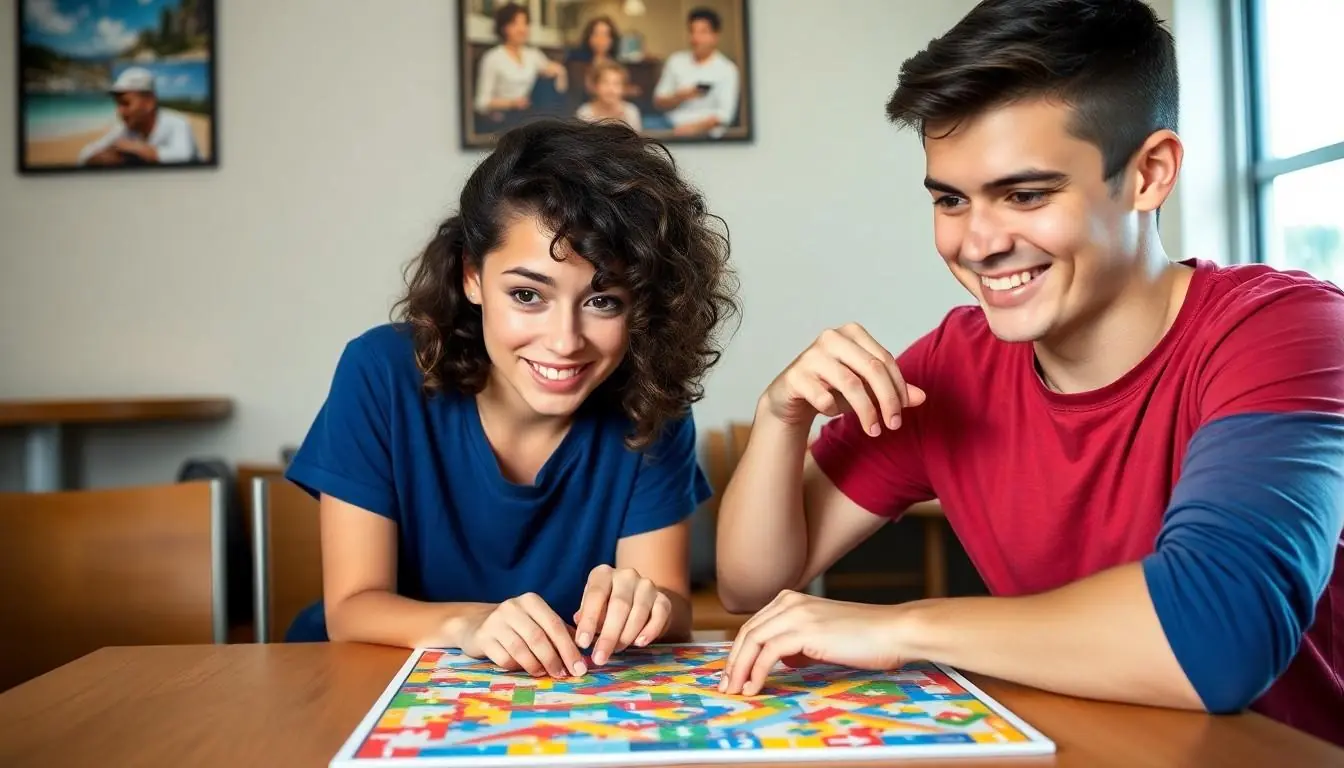In a world where teamwork makes the dream work, two player puzzle games are the ultimate brain-bending duo for friends, siblings, or even that one coworker who insists they’re better at everything. Imagine the thrill of solving intricate challenges together while simultaneously questioning each other’s life choices—what could be more fun?
These games not only sharpen your wits but also serve as the perfect excuse to unleash some friendly competition. Whether it’s navigating mazes or deciphering cryptic clues, every level brings laughter and a sprinkle of frustration. So grab a partner, put on your thinking caps, and get ready to unlock the secrets of fun and strategy in the captivating world of two player puzzle games.
Table of Contents
ToggleOverview of Two Player Puzzle Games
Two-player puzzle games engage participants in collaborative or competitive challenges. Often, players must use strategy and critical thinking to solve problems together. These games encourage effective communication and teamwork, essential skills for both social interactions and competitive gaming.
Participants can choose from various types of two-player puzzles, including logic games, word puzzles, and physical challenges. Logic games, like chess or Connect Four, require players to plan moves and anticipate their opponent’s strategies. Word puzzles, such as Scrabble or Boggle, test vocabulary and quick thinking. Physical challenges, such as jigsaw puzzles, promote hand-eye coordination alongside cognitive skills.
Availability of these games spans platforms, from board games to mobile applications. Many options cater to different skill levels, ensuring everyone can find something appealing. Game developers continue to innovate, creating engaging experiences that draw in players of all ages.
Research indicates that playing puzzle games can enhance problem-solving skills and improve memory retention. Players often report a sense of accomplishment after completing difficult challenges together. Friendly competition usually leads to laughter and builds stronger bonds between participants.
Overall, two-player puzzle games offer enjoyment and foster critical skills, making them an ideal choice for friends, siblings, or coworkers seeking to have fun while exercising their minds.
Popular Genres
Two-player puzzle games encompass various genres, each offering unique themes and gameplay mechanics. Engaging in these games consistently sharpens problem-solving abilities while enhancing teamwork.
Cooperative Puzzle Games
Cooperative puzzle games focus on collaboration. Players share objectives and combine efforts to solve challenges. Examples of these games include titles like “Portal 2” and “Keep Talking and Nobody Explodes.” In “Portal 2,” players navigate through physics-based puzzles using portals, relying heavily on communication. “Keep Talking and Nobody Explodes” involves one player defusing a bomb while the other reads the manual, showcasing real-time problem-solving under pressure. These experiences enable friends or partners to strengthen their communication skills while nurturing a dynamic sense of achievement.
Competitive Puzzle Games
Competitive puzzle games introduce elements of rivalry. These games create an environment where players race to solve puzzles quicker than their opponents. Popular examples include “Tetris” and “Puyo Puyo.” In “Tetris,” quick-thinking players stack falling blocks to clear lines, competing for the highest score. “Puyo Puyo” challenges players to match colored blobs, using strategies to hinder opponents while optimizing their setups. Engaging with competitive puzzle games enhances strategic thinking and adaptability as players encounter and counter each other’s tactics.
Top Two Player Puzzle Games
Two-player puzzle games provide a unique blend of challenge and social interaction. Here are some top picks for cooperative and competitive gameplay.
Game 1: Description and Features
Portal 2 captivates players with its innovative mechanics and engaging storyline. Players utilize a portal gun to solve intricate puzzles, requiring precise timing and collaboration. The game specifically focuses on teamwork, as one player navigates while the other provides communication and insight. The cooperative campaign features various unique challenges, encouraging creative problem-solving. Its witty dialogues and clever level design enhance the overall experience.
Game 2: Description and Features
Keep Talking and Nobody Explodes promotes intense collaboration through a bomb defusal scenario. One player interacts with the bomb, while the other follows a manual to provide instructions. The game emphasizes clear communication, as time pressures heighten the stakes. Players encounter diverse modules, each requiring different types of knowledge and strategies. Participating in this game leads to thrilling moments and a strong bond between teammates.
Game 3: Description and Features
Tetris offers classic competitive gameplay that stands the test of time. Players engage in fast-paced puzzle-solving, competing to clear lines and score points while managing rising blocks. The simple yet addictive mechanics encourage both skill development and quick thinking. Tetris fosters friendly rivalry, engaging players from varied skill levels for high-energy challenges. This iconic game remains a reliable choice for those seeking fun and competitive excitement.
Benefits of Playing Two Player Puzzle Games
Playing two-player puzzle games enhances cognitive abilities. Teams collaborate on complex challenges, leading to improved problem-solving skills. Players often engage in strategic thinking, which sharpens critical reasoning capabilities.
Interaction in these games fosters effective communication. Conversations about strategies or tactics arise during gameplay, improving verbal skills. As individuals share ideas, teamwork strengthens, benefiting relationships among friends, family, or coworkers.
Enjoyment is another significant advantage. Laughter often occurs as players navigate tricky puzzles together; this contributes to positive social experiences. Friendly competition introduces excitement, encouraging players to push each other to excel.
These games provide opportunities for stress relief. Engaging in cooperative gameplay allows individuals to escape daily pressures, promoting relaxation. Players commonly feel a sense of accomplishment after overcoming obstacles, boosting overall morale.
Because puzzle games cater to various skill levels, they appeal to a broad audience. Options range from simple word puzzles to intricate logic games, ensuring everyone can find something fun. Accessibility across different platforms further enhances engagement, making it easy for players to join the fun.
Research supports the notion that playing these games improves memory retention. Players often find themselves recalling information more effectively after repeated gameplay sessions.
Additionally, exposure to puzzle games contributes to better social skills. Individuals working together must navigate disagreements and negotiate solutions, fostering empathy and understanding. These interactions lay the foundation for lasting friendships.
Overall, choosing to play two-player puzzle games enriches experiences while building a variety of essential skills. The blend of challenge and camaraderie truly makes these games valuable.
Conclusion
Two-player puzzle games offer an engaging way to bond while sharpening cognitive skills. They create an environment where teamwork and friendly competition thrive. Players can enjoy a rich variety of experiences from cooperative challenges to competitive races.
These games not only foster effective communication but also enhance problem-solving abilities. The joy of overcoming obstacles together leads to memorable moments and strengthens relationships. With a wide range of options available across platforms, there’s something for everyone.
Whether it’s a casual game night or a more intense session, two-player puzzle games provide endless fun and opportunities for growth. Embracing these games can lead to a fulfilling mix of entertainment and skill development.




